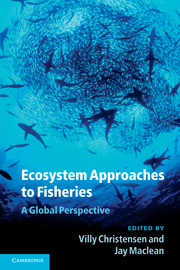Book contents
- Frontmatter
- Contents
- List of contributors
- Foreword
- Preface
- Acknowledgments
- 1 Introduction: toward ecosystem-based management of fisheries
- I Life in the oceans
- 2 The oxygen constraint
- 3 Organizing and disseminating marine biodiversity information: the FishBase and SeaLifeBase story
- 4 The science in FishBase
- II Evaluating impact on marine life
- III Managing living resources
- IV The human side
- V Impacting policy
- Index
- References
4 - The science in FishBase
Published online by Cambridge University Press: 05 June 2012
- Frontmatter
- Contents
- List of contributors
- Foreword
- Preface
- Acknowledgments
- 1 Introduction: toward ecosystem-based management of fisheries
- I Life in the oceans
- 2 The oxygen constraint
- 3 Organizing and disseminating marine biodiversity information: the FishBase and SeaLifeBase story
- 4 The science in FishBase
- II Evaluating impact on marine life
- III Managing living resources
- IV The human side
- V Impacting policy
- Index
- References
Summary
INTRODUCTION
FishBase is an online information system with key information on all the known fishes of the world, i.e., over 30,000 species. This key information has been extracted, standardized, and evaluated by a team of specialists from over 40,000 scientific publications. The rationale and development of FishBase are presented in Palomares and Bailly (this volume), who demonstrate that FishBase, the successive editions of the book that document it (notably Froese and Pauly, 2000) and individual chapters therein are heavily cited in both grey and peer-reviewed scientific literature. Indeed, such information has been crucial for numerous high profile studies, including in high profile outlets such as Science and Nature.
Nevertheless, there have been suggestions that FishBase is a laudable exercise in compiling scientific information, similar to a scientific library, but that its creation and maintenance are not “science,” or even “research.” Using that logic, one could argue that the work done by all scientists who collect and standardize their data prior to analyzing them is not “science.” Also, one could argue that the evaluation of published data prior to their encoding and the tagging of some estimates as “doubtful” (as done by the experienced FishBase encoders) is equivalent to the critical assessment performed by the authors of scientific reviews – who undoubtedly do science.
Rather than developing these arguments, however, I suggest that the scientific status of FishBase can be evaluated by establishing that, based largely on data extracted from FishBase, new insights have been made and published, and that the papers in question have been cited by other scientists.
- Type
- Chapter
- Information
- Ecosystem Approaches to FisheriesA Global Perspective, pp. 47 - 52Publisher: Cambridge University PressPrint publication year: 2011
References
- 7
- Cited by



